
Are reciprocal links good for SEO? At first glance, they seem like a simple win—you link to me, and I’ll link to you.
We all know backlinks are influential SEO factors that you need to rank higher in Google and other search engines.
But the truth is, not all backlinks are the same.
Backlinks are crucial for ranking higher on Google, but building high-quality links is one of SEO’s biggest challenges. While it’s easy to get links from low-quality sites, these do little to improve your rankings.
To boost your SEO, you need backlinks from authoritative, relevant sites.
But is reciprocal linking the right strategy? Not always.
In this blog post, we will look at reciprocal linking for SEO, we'll answer the commonly asked question "Are reciprocal links good or bad for SEO?"
And by the end of this post, we'll show you how to do reciprocal linking the right way, without getting penalized by Google.
What are Reciprocal Links and How Do They Work?
Reciprocal links occur when two or more parties link to each other on their respective sites.
For example, site A wants to boost page X's search engine ranking for a target keyword.
- Site A would then reach out to site B proposing that they exchange links.
- Site A would request site B to link to page X. In return, site A will place a link to site B's page Y—or any chosen page that site B wants to have ranking in search results.
In layman's terms, it's very similar to the "I’ll give you a link, if you give me one in return" concept.
Both parties acquire links from each other in the hopes of raising the search ranking of their pages for their respective keywords. Once their rankings do increase, they can attract more clicks and increase their traffic.
Do Reciprocal Links Really Work?
Reciprocal linking is a divisive topic in the SEO community.
To apologists, reciprocal links are just like any acquired backlinks from any site. For them, it doesn't matter if the process of link exchange is prearranged.
As long as the link points back to your site, it will be treated like any other backlink.
To dissenters, this link building tactic can be considered as a link scheme and violates Google's Webmaster Guidelines.
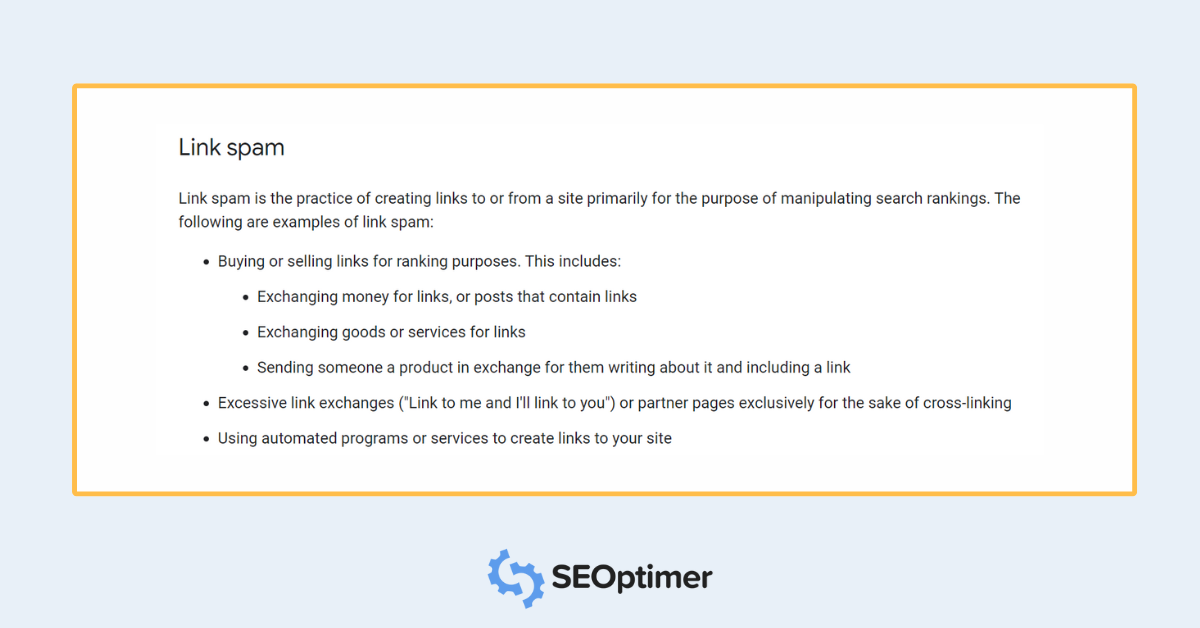
These types of links aren't acquired through natural means—it takes two or more site owners to collude and link back to each other's sites.
Compared to other link building techniques, reciprocal linking has the greatest possibility of being abused.
A webmaster can reciprocally link between sites he or she owns and pass the backlinks off as earned. Site owners may rely on this tactic to build links in the hopes of increasing their search position, which could result in spammy links.
As you know, the web is a big place, with thousands of websites linking to different resources. The odds of linking to someone who’s already linked to you certainly exist.
I’m pretty sure Google won’t see that as spam and penalize every site that does this.
For instance, I checked SEOptimer's link profile using our Backlink Research tool and found that we have several backlinks from leading publishers such as Zapier, HubSpot, and Backlinko.
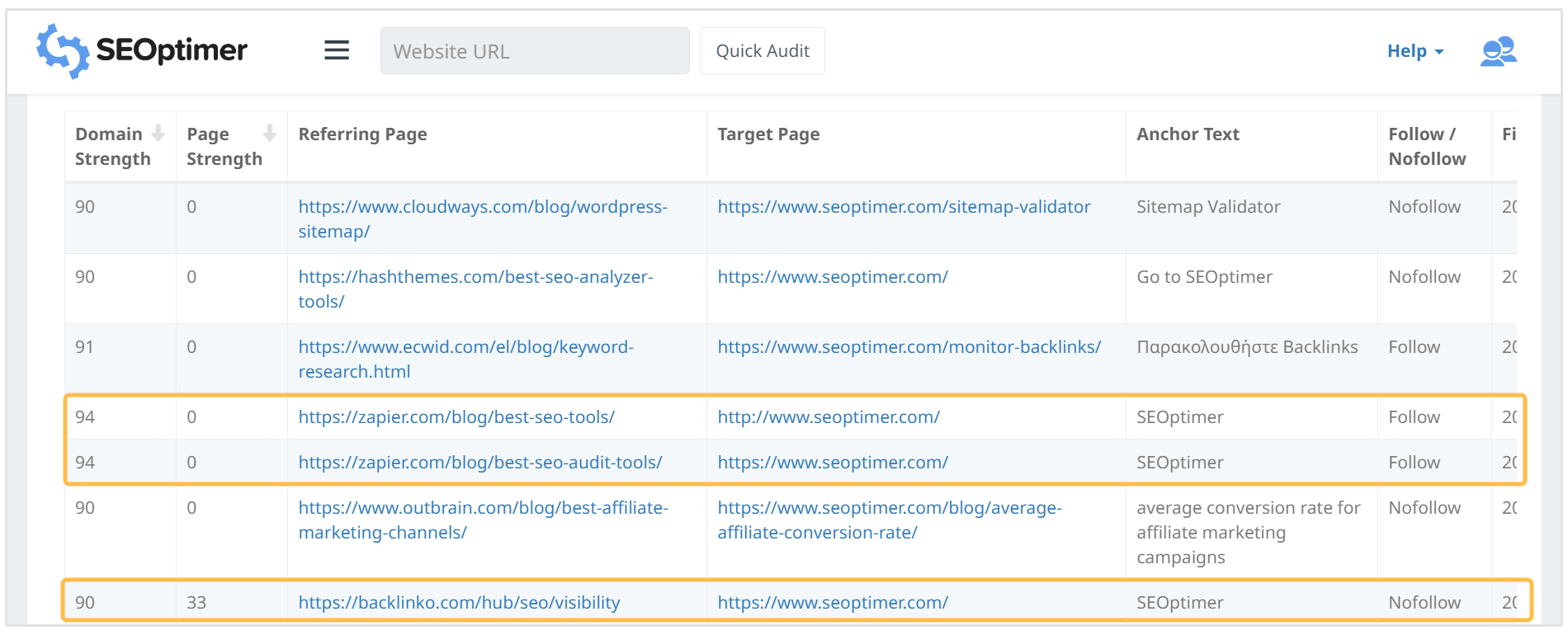
Likewise, we also link out to some of their resources in our content.
Will this linking be seen as spam by Google? If that's the case, then many well-know internet brands and publishers will avoid linking out to other high-quality resources just to avoid being caught doing reciprocal linking.
Now, there’s a way to do reciprocal linking to avoid getting penalized by Google.
Let’s look at how you can do reciprocal linking for SEO the right way.
How to do Reciprocal Linking the Right Way
While the last section may seem to make a case against reciprocal linking, there's no solid proof to back up these claims.
There are no case studies that attest to the effectiveness, or lack thereof, of reciprocal links in SEO.
While the jury is still out on reciprocal linking, there are questions that you should ask yourself when approaching this tactic:
Is the Link Contextually Relevant?
If you're trying to earn a link from a site that has high SEO metrics but has nothing to do with your niche, then you're obviously manipulating your search results, which is against Google's guidelines.
It makes your link stand out like a sore thumb and leaves a bad taste in the mouths of readers.
Worse, your page's position may drop in search results because you disregard the relevance of your link to the content.
To avoid issues with this tactic, you need to exchange links with sites related to the topic of your site.
If you want to build links to your site about automobiles, for instance, you need to exchange links with people who own sites about road travel and auto repair.
The below screenshot shows the link profile for Car and Classic, a website where you can find classic cars that are for sale. Take note of the link that I've highlighted, it's from a website called MotorBiscuit, which reports on the latest news in the automotive world.

Both niches are related to cars and vice versa so it makes sense to link back to each other.
It's also important to consider that, in most cases, the sites conducting reciprocal link exchanges are non-competing sites.
Site owners don't reach out to sites vying for the exact same target keywords because the chances of getting a link from that site are slim to none. Reciprocal links work best when the sites are somewhat related thematically, but are targeting different keywords and audiences.
Are You Adding Value to Your Content?
Linking to high-quality resources related to your article will help readers learn more about the subject.
Getting a link back from another site should only be a consolation prize.
The most important thing is supplying your target audience with the best possible information, which also includes the links you feature in the content.
Does the Link have Good SEO Metrics?
For reciprocal linking, ironically enough, SEO metrics should be an afterthought.
You need to focus on providing value to the audience of the site you wish to acquire a link from.
However, if you want to maximize your reciprocal linking, you should still check the SEO metrics of your prospective site.
Real-life Examples of Reciprocal Linking
One of the earliest examples of reciprocal linking comes from an online directory.
For the directory to successfully include your link, you either need to pay them or link back to their site on your homepage.
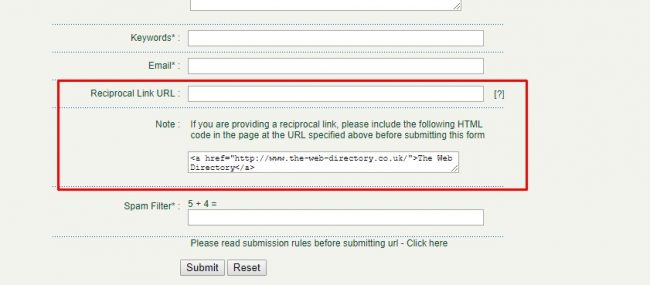
If you don't pay online directories, then you should instead link out to them on the page you're submitting to them. It's an ingenious way for them to acquire more links.
This practice is prominent among online directories even today. However, they no longer carry the weight they did years ago in terms of SEO, which explains why you no longer see links to directories on most sites.
Also, you don't want to link out to these if you want to improve your site's overall SEO performance—which I'm sure you do.
Linking to directory sites doesn't make sense for most, especially if you're working on a site that has nothing to do with directories.
If you want to continue with this tactic, at least submit your sites on directories that don't require reciprocal linking.
Another avenue where reciprocal linking is rampant nowadays is blogger outreach.
Some outreach emails I've received about linking to the sender's resources are bad. They don't really care about providing value to my site—they simply want to get that all-important backlink on my site.
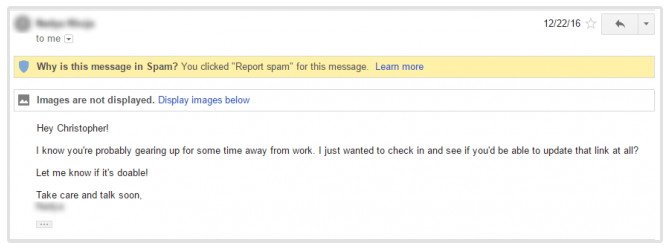
However, I've received outreach emails that make a great case for reciprocal linking:
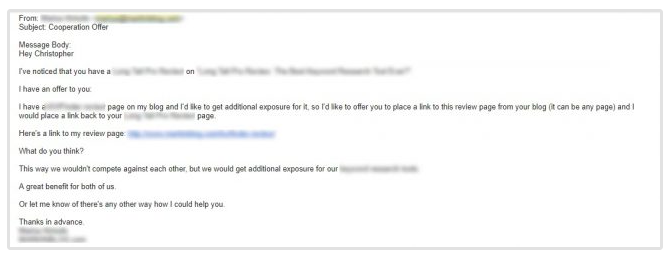
In the example above, it's clear that the blogger is thinking about the value his resource page will provide to me and my audience.
He makes a very reasonable proposal and explains the SEO benefits his idea will bring to our pages. Also, the page he wants me to link on my site is insightful and offers value to my readers.
Comparing both emails I received is like night and day.
Blogger outreach for reciprocal linking is only as good as the intention behind it.
If you simply want to generate backlinks to your page, then don't expect to get backlinks at all. I felt this was the modus operandi of the blogger in the first example, which is why I ignored his request.
Is Reciprocal Linking Right for Me?
The truth of the matter is that reciprocal linking is a curious case. There's no hard data that analyzes the relationship between reciprocal linking and SEO.
Therefore, the verdict is still up in the air for reciprocal linking.
I'm not saying that reciprocal links are in the clear and you should integrate them into your link-building strategy.
What I am saying, however, is that you should practice common sense when it comes to building links.
Since this tactic remains in the SEO gray area, you need to approach it with caution. If you feel the need to practice it on your site, you should always think of your audience and think of how your links will impact the quality of your content for your readers.
In other words, if the priority of your reciprocal link building is to simply generate as many links as possible, then it won't work.
Reciprocal Links: FAQs
Can Reciprocal Links Hurt My Website's Ranking?
Yes, if the links are part of a link exchange scheme or come from low-quality, irrelevant websites, they can negatively impact your ranking.
Should I Avoid Reciprocal Links Entirely?
No, reciprocal links are fine when used naturally, such as between trusted partners or related sites. Avoid engaging in link exchange programs that aim only to boost SEO.
What’s the Best Alternative to Reciprocal Links for SEO?
Building one-way, natural backlinks from authoritative and relevant websites is the most effective way to improve your SEO and rankings.










